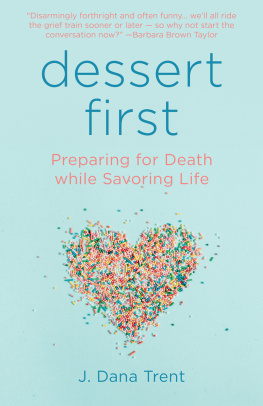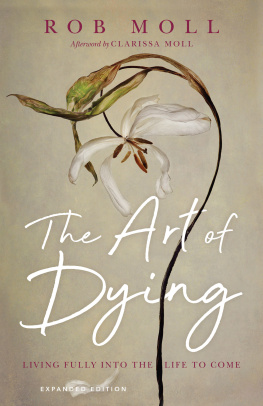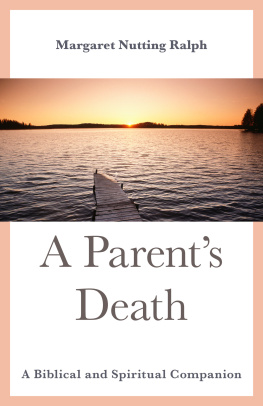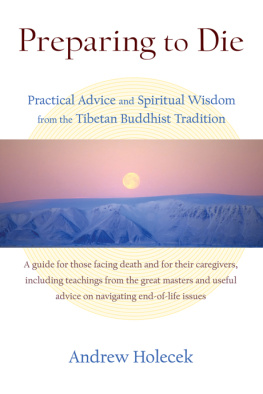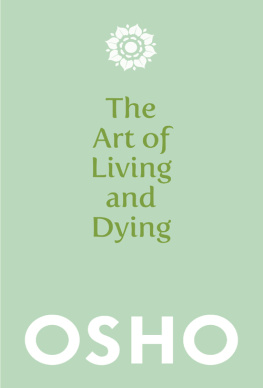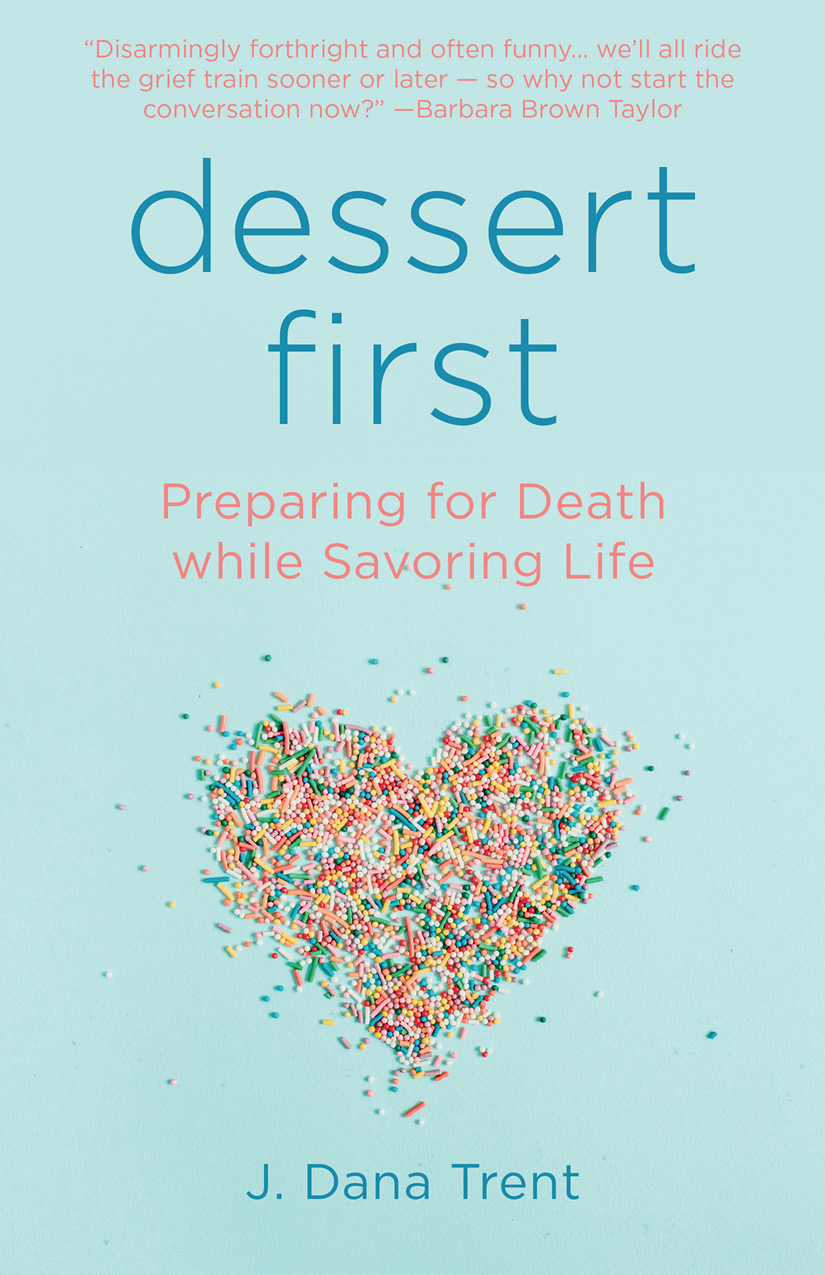Praise for Dessert First
If grief is the language of love, this unflinching book shows us how to love a little deeper.
Kate Bowler, author of Everything Happens for a Reason (and Other Lies Ive Loved)
In this disarmingly forthright and often funny book, Dana Trent reminds her readers that were all terminal, and well all ride the grief train sooner or laterso why not start the conversation now? Her ability to convey what she has learned as a hospital chaplain, a daughter, and a teacher grounds every page in the real world, making it impossible to resist her invitation to begin thinking about The End in a lifegiving way.
Barbara Brown Taylor, author of An Altar in the World
We arent very good at talking about death. Thankfully we have people like Dana to walk with us. Her writing here is approachable and honest, and her compassion overflows as she leads us into the difficult but necessary places. Dessert First is both a deeply moving and incredibly practical guide for dying (and living) well. Its essential reading for the mortals among us.
John Pavlovitz, author of A Bigger Table and Hope and Other Superpowers
Dessert First really helped me. It helped me prepare for the deaths of people I love. It helped me prepare for my own death. Dont worry: it isnt a book written by Miss Morbidity. Dana Trent is funny and professional and human, exactly the kind of person you want to help you face lifes one actual certainty.
Brian D. McLaren, author/activist
Dessert First is a delicious treat nourishing and enjoyable. A timely reminder not to neglect the things that matter most. Practical, truthful, needed.
Philip Gulley, author of If the Church
Were Christian
What is a good death? How does one prepare? Dana Trents Dessert First is a complete book. It is filled with practical wisdom gleaned from religious reflection and practical experience as an end-of-life chaplain. She has somehow transformed that experience into a joyful assessment of life and preparation for its end. Trents wisdom comes in narrative form, which adds to the accessibility and, dare I say, enjoyment of this thoughtful book. It deserves many readers.
Richard Lischer, Duke Divinity School, author of Stations of the Heart: Parting with a Son
There is great freedom in accepting the reality of death. There is even joy. And possibly a great deal of humor. It is all here in Dessert First, a book about death that adds up to the fullness of life implied by the title. Dig in.
Erin Wathen, author of Resist and Persist: Faith and the Fight For Equality, and Patheos blog Irreverin
Copyright
Copyright 2019 by J. Dana Trent.
All rights reserved. For permission to reuse content, please contact Copyright Clearance Center, 222 Rosewood Drive, Danvers, MA 01923, (978) 750-8400, www.copyright.com .
Bible quotations, unless otherwise noted, are from the New Revised Standard Version Bible, copyright 1989, Division of Christian Education of the National Council of the Churches of Christ in the United States of America. Used by permission. All rights reserved.
Quotes from the Bhagavad-gt are from Swami B.V. Tripurari, Bhagavad Gita: its feeling and philosophy (San Rafael, Calif.: Mandala, 2010).
Cover design: Jennifer Pavlovitz
ChalicePress.com
Print ISBN: 9780827206694
EPUB: 9780827206700 EPDF: 9780827206717
Dedication
For Ron, with gratitude for all you did for Momand me.
Contents
Introduction: Were All Terminal
You would know the secret of death. But how shall you find it unless you seek it in the heart of life?
Khalil Gibran, On Death, The Prophet
A book telling people how much I hurt would not do any good. This had to be a book that would affirm life.
Harold Kushner, When Bad Things Happen
to Good People
Is it a regional? Mom used to ask.
Whenever I traveled by plane, shed inquire as to an aircrafts size. If it held 100 passengers or less, her anxiety unfurled into a rant on the dangers of puddle jumpers. This, coming from a woman who, as an infant, was flown in her fathers two-passenger Cessna across state lines so that my grandmother could change her diaper.
But at the beginning of what became a turbulent regional ride from Atlanta from Birmingham, my mothers ever-present dis-ease with small planes rang true. Though Mom had died six months prior, as with most close mother-daughter relationships, her advice still haunted me.
The airline showed its innocuous emergency procedures video to us, a medium-sized congregation of unsuspecting passengers. We watched on headrest screens as earnest, cheerful employees parsed disaster protocol with far too much enthusiasm. Speaking from an array of skin colors, accents, body shapes, and sizes, they provided requisite information so that, should we plummet to our death mid-flight, everyone would do so safely .
In pressed navy uniforms and professionally whitened teeth, attendants demonstrated oxygen masks, signaled manicured hands toward floor-level exit lighting, and modeled inflatable life vests. The message was clear: Were going to die in a way that meets federal aviation requirements.
It was the first puddle jumper Id taken since my mother died. This time, there had been no call to inquire, Is it a regional? I was 36 and mid-grief, facing the fact that Id lived long enough to lose both parents, and beginning to wrestle with the idea that I was closer to the end of life than its beginning.
Why do these safety assurances, shown in every flight, every day, speak nothing of actual death? I wondered. Why are we in such denial about our sure end? Why not tell us something useful during these plane didactics, such as what to say to our loved ones should we get the chance, rituals to keep from losing our minds mid-downward spiral, or prayers invoking the benevolence of whoever holds the keys to our (hopefully) glorious destination?
My brother Ron, my mom, and I had seen the film Sully together. Mom had loved Tom Hankss portrayalbut had also known there was only one real Captain Sullenberger.
And he was now retired. The once-in-a-million aircraft survival story had already been used up on the Hudson River.
Mom was now gone, but her disdain for puddle jumpers still echoed in my memory. Listening to the video of the flight attendant spiel, I wished that I were told something more true, more helpful, perhaps along these lines:
In the event of a plane emergency, we will die. At that time, stuff yourself with as many of those delicious cookies or pretzels you want and place your oxygen mask on if it makes you feel better. But dont waste time fumbling for those damn water wings known as your seat cushion. Forget the exits; instead, review the multifaith rituals card weve placed in your seat pocket. Atheist? No worries. Breathe deeply anyway. Faith or no faith, take a second to switch off airplane mode and use whatever signal we have to text, call, or Facetime anyone youd like. Hold hands with the passenger next to you; theres no time like the present to make new friends. As we make our final descent (literally), here are three useful ways to position your body to ensure youll die on impact. No prolonged suffering on our watch! Thank you for choosing our airline.
Were all terminal, Id heard author Kate Bowler say in a lecture I attended six months after Mom died. Some of us just have more information. Id begun to heed both their insights: I was terminalwe all areand I could die anytimeeven in this metal tube 30,000 feet above the Southeast.

